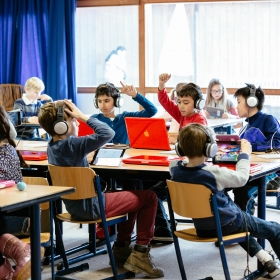Happy students are learning students
Published on isbi School News dated Thursday 17th of January 2019
“What is special about MIS?” This is probably the most frequent question that I hear as the Head of School. My answer is invariably about how happy students are to come to school. I have worked at four other schools, and I have never witnessed a school where students arrive in the morning so glad to be at school. And it is not only the primary school aged children who walk onto campus with a smile each morning. Even MIS Middle and Senior School students seem genuinely happy to be at school. That answer may seem superficial. It may surprise some that my answer isn’t more“academic”in its tenor. However, I know from experience how important students’emotional state is for their success at school. Happy students learn better. Motivation for learning is highly correlated with better grades, persistence in the face of academic challenges, higher quality school work, and higher achievement on standardised tests (Eldridge). This happiness, this motivation to come to school and to learn, does not happen by accident. Teachers and administrators at MIS engage in a range of strategies intended specifically to promote student well-being and increase their motivation for learning. There are numerous aspects of our approach that lead to these positive outcomes. Care Students are motivated to learn when they believe that their teachers genuinely care about them. This is one important reason that we place so much emphasis on recruiting teachers who prioritise taking the time to get to know their students. When teachers know their students, including knowing about their interests, their backgrounds and their individual challenges, they can better tailor their instruction to appeal to their needs. Classes with no more than a maximum of 24 students help ensure that teachers have the time, energy and attention to develop caring relationships with their students. Care is one of MIS’ four core values (Care, Respect, Integrity and Trust). Our Mission, our values and our policy on teaching and learning all emphasise the crucial role that relationships between students and teachers play in helping students develop motivation that facilitates learning. We are so fortunate at MIS to have so many educators who invest generously of their time and energy to demonstrate an exceptional level of care for their students. This investment pays dividends in student learning. Choice A prominent element of our strategic plan is Student Choice and Student Voice. Students are more motivated to learn when they are given some control over their learning (Vanderbilt University Center for Teaching). MIS has long offered a wide variety of IB Diploma courses to students in Grades 11 and 12, allowing students to customise their profile of classes to suit their interests. Beginning this school year, we implemented a new time table structure in Grades 9 and 10 that allows students to take more classes in areas of personal interest. Additionally, new, contemporary courses have been added to Grades 9 and 10, including Coding and Computing, Integrated Humanities and (beginning in August 2018) Unsere Welt in unserer Zeit. Another important dimension of student choice is our inquiry-based approach to learning. Students are empowered and encouraged to ask questions and construct their own lines of inquiry to seek answers to those questions. Already in Early Childhood classes MIS teachers support students in being independently curious and pursuing knowledge and understanding arising from their own sense of wonder.This approach values students as thinkers and adds significantly to their motivation to engage in durable, meaningful learning. Concepts In traditional curricula, students might often ask, “Why do I need to know this?” The standard way of teaching facts requires students to learn information that is locked into a specific time, place or situation. If a student is not interested in that situation, the learning can seem senseless and irrelevant. Teachers at MIS, however, strive to embed student learning within high-level conceptual contexts, which engage students’intellectual and emotional capacities. A conceptual framework for learning focuses on understanding big, timeless concepts. A few examples include: equilibrium, conflict, interdependence, perspective, power, oppression, allegory, and prejudice. These concepts form part of the underlying structure of human knowledge and are relevant to the thinking of all people (H. Lynn Erickson Synergistic Thinking). Specific facts are still very important, as they provide the illustrative examples that give life to these concepts. However, by focusing first on the “why”, by focusing on the conceptual understanding, teachers are helping students engage in learning that is deeper, more personally meaningful, and much more likely to be retained. And, very importantly, students are being challenged to engage in learning that is motivating. Happy Students Care, Choice and Concepts are just a few of the attributes of the MIS educational experience that contribute to motivated, happy students. I could mention several further components, like the balance of academic learning with social, emotional and physical learning; our belief that every student can succeed (growth mindset); and our aim to provide students with learning experiences that form an appropriate level of challenge. Taken together, these many intentional strategies combine to create a school and a programme of learning that promotes student happiness and leads to successful learning. Timothy Thomas, Head of School -------------------------------------- Sources: Eldridge, Gordon. How Can We Increase Student Motivation? The International Educator, Vol. 32 No. 4 April 2018, page 17. H. Lynn Erickson. Synergistic Thinking and Conceptual Understanding in the IB Programmes. IB Global Conference, October 2011, The Hague, Netherlands. Keynote Address. Motivating Students. Vanderbilt University Center for Teaching. https://cft.vanderbilt.edu/guides-sub-pages/motivating-students/ . Accessed 6 June 2018.



